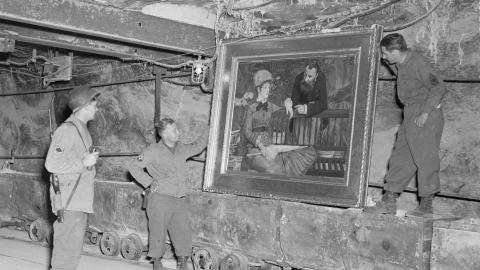Mo Mowlam: Biography
Marjorie Mowlam, the second of three children, was born in Watford, 21 miles northwest of London. She grew up in Coventry, in the West Midlands, and it was here that her alcoholic father, Frank, became Coventry’s assistant postmaster. Her mother, Tina, worked as a telephonist to help supplement the family’s income and was a strong and determined woman.
Mowlam began her schooling at Chiswick Girls’ grammar school in West London. She was the only one of the Mowlam children to achieve the 11 plus examination and went on to complete her schooling at Coundon Court comprehensive school in Coventry. She became interested in politics at an early age and also thought about becoming a doctor, as she felt their work was practical and ‘got results’.
Mowlam went to Trevelyan College in Durham, where she read Anthropology and Sociology. During her first year, she joined the Labour Party and later worked for Tony Benn, Labour MP in London, as a research assistant and for American writer Alvin Toffler. Following her graduation from Trevelyan College, Mowlam moved in 1973 to America, where she completed a PhD in Political Science at the University of Iowa. In 1977 she lectured briefly in Politics at both the University of Wisconsin and Florida State University.
Accepting a post to lecture Politics at the University of Newcastle upon Tyne, Mowlam returned to England in 1979. She also worked in adult education at Northern College, Barnsley, with students who had fewer opportunities than traditional university students. She arranged a series of alternative lectures that were published as ‘Debate and Disarmament’ in 1981, which she jointly edited. Proceeds from the book went to the Campaign for Nuclear Disarmament.
Having been a member of the Labour Party since 1969, Mowlam was elected Labour MP for Redcar, North Yorkshire in 1987. It was a position she held for 14 years, until 2001. She later became a member of the influential House of Commons Public Accounts Committee and the party’s ruling National Executive Committee. In 1994 she helped to organise Tony Blair’s leadership bid. He later described her as “one of the most remarkable and colourful personalities ever to enter British politics”. Blair made her Shadow Secretary of State for Northern Ireland and over the next few years, she held various Opposition posts.
In 1995, at age 46, Mowlam married Jon Norton, a merchant banker turned artist. Whilst she had not married before and had no children of her own, she enjoyed family life with Norton and his two children from a previous marriage.
A few weeks before the May 1997 general elections, Mowlam was diagnosed with a benign brain tumour and had to undergo radiotherapy and steroid treatment. As a result, she gained weight and lost her hair, having to wear a wig, but did not let it affect her work. She was soon dubbed ‘Brave Mo’. When Labour won the 1997 elections, Mowlam was appointed Secretary of State for Northern Ireland and later that year, was admitted to the Privy Council for Northern Ireland. Her main task was to help find a peaceful solution to the longstanding troubles of Northern Ireland.
In early 1998, when negotiations in Northern Ireland had reached an impasse, Mowlam took a significant political risk. She entered the Maze Prison near Belfast, to speak to convicted Irish paramilitaries face-to-face, when it became apparent that the peace process required their backing. Following her visit with the prisoners, their political representatives announced they were rejoining the talks. Shortly after, the Good Friday Agreement for Ireland was secured on 10th April 1998.
After a government reshuffle in October 1999, Mowlam became Minister for the Cabinet Office and Chancellor of the Duchy of Lancaster. She was also granted freedom of the city of Coventry, where she grew up. Later that year, she was replaced by Peter Mandelson and became Blair’s Cabinet ‘Enforcer’, after turning down the job of Health Secretary. She was responsibile for several important issues, including drugs policy and parliamentary reform.
Mowlam held this office until, increasingly disenchanted with Blair’s leadership, she became a vocal opponent of the war in Iraq. In early 2000, she personally informed the press of her boredom with her job, telling them she wanted to be the Labour candidate for the post of Mayor of London. On 4th September 2000, she announced her intention to retire from Parliament and finally stepped down as an MP at the General Election of June 2001.
Following her retirement from the House of Commons, Mowlam focussed on foreign policy towards Iraq and became a noted critic of government policy, particularly in this field. In an unlikely step, she took on the job of Agony Aunt for men’s magazine ‘Zoo’, giving frank answers to sex questions. Mowlam set up a charity called MoMo Helps, to assist rehabilitating drug users and to provide support for the parents or carers of disabled children. In 2002, Mowlam published her political memoirs, entitled ‘Momentum’.
On 3rd August 2005, the BBC announced that Mowlam was critically ill at King’s College Hospital in London. She had been suffering with balance problems as a result of the radiotherapy she had been receiving and had fallen and hit her head at home earlier that month. Having failed to gain consciousness, and in accordance with her living will, in which she had specified she did not wish to be resuscitated, food and water were withdrawn. She died a natural death at age 55 on 19th August 2005, at Pilgrim House Hospice in Canterbury Kent.
Her funeral was a quiet family occasion but two memorial services were held for her. The first on 20th November 2005 at The Theatre Royal in Drury Lane, London and the second in Redcar, on 3rd December 2005.
Mowlam will be remembered for her toughness and courage, as well as her persistence and good humour. She was affable and straightforward and able to talk to anyone. She gained an enormous amount of public popularity and support for her work in Northern Ireland, by handling what was arguably one of the most dangerous and challenging jobs in government. She was unafraid and willing to talk face-to-face with terrorists, her modus operandi being to try to bring two sides together, not by imposing solutions made by others, but by listening to what the people involved actually wanted. In terms of Irish politics, this standpoint was rather refreshing and went a long way towards the building of a peace process that has endured for more than a decade.










